- Home
- Lisa McMann
The Trap Door Page 2
The Trap Door Read online
Page 2
“SHE MIGHT be an abolitonist, but she’s no Hystorian,” Riq said. His stomach fell.
“But . . . but she said she was on our side,” Dak said. “Why else would she say that?”
Sera groaned. “She thinks Riq’s a slave and we came here to hide him.” She plopped to the floor and sat in a miserable heap. She sneezed, wiped her nose on her glove, and looked at Dak. “Why’d you kick me? I’m not going to let anybody think Riq is our slave. That’s just ludicrous, and I won’t do it.”
“I didn’t kick you,” Dak said.
Riq leaned against the wall. “I did,” he said. He dug the heels of his hands into his eye sockets and rubbed. He felt weary and defeated. And mad. Really mad.
“Why?”
“Because . . . well, because it’s 1850, and it’s complicated. I don’t even know why. But I do know we can’t stay locked up in here.” He set his jaw. “I’m not staying here, anyway.” He took the SQuare from Dak, who seemed happy to be rid of the device. It shook in Riq’s hands as he jabbed at the buttons. He took a deep breath and let it out slowly. “Calm down,” he whispered so quietly that neither of the two heard him. The SQuare powered up, casting an eerie glow in the dimly lit cellar.
“Where precisely are we, again?” Dak asked. “What city?”
“Cambridge, Maryland. December 1850.” He waited a beat, and then added, “That’s in the United States. They speak your one language here.”
“Very funny. Well, I guess we don’t need you, then.”
“Fine.” Riq handed the SQuare back to Dak. “Good luck.”
Dak’s mouth fell open. “Okay, well, try and go, then.” He pointed to the ceiling. “There’s the door.”
“Come on, you guys.” Sera let her head rest against the wall. “Riq, don’t let him bait you,” she pleaded.
Riq felt the heat rise in his face, which was actually sort of helpful since it was not much warmer in the cellar than it was outside.
Dak’s look of surprise stayed on his face as he turned to Sera. “What, you think I’m a pest now, too?”
Sera glared. “Are you saying you aren’t?”
“Just stop. Everybody stop it,” Riq said. “Okay? I’m sorry. Sera’s right. Bickering isn’t going to get us anywhere.”
“Who’s Bickering? I thought her name was Beeson,” Dak said, almost with a snort. But then he stopped. “I mean, I’m sorry, too, Ser, ol’ buddy.”
Sera wiped the remaining drips from her face with her sodden gloves, and then she stripped them off. “Fine. Just . . . turn around,” she said. “Now. I can’t stand these sopping-wet oversized doll clothes any longer.”
The boys whipped around to face the wall as Sera scuffled about, changing into a set of dry clothes. She muttered as she dressed: “Just please tell me we’re not in another stinking war.” She flapped her arms in the air. “Sorry this is taking me so long — I’m trying to air-dry.”
Dak guffawed. “Of course it’s not a war. Eighteen-fifty in the United States? Well, I guess technically there was the Mariposa Indian War with California in the fall of 1850, but everybody knows California was barely a state yet, and those gold diggers just jumped right into things and took over the Yosemite Valley. And that’s happening clear across the country!” He paused. “Oh, you’re thinking of the Civil War, I bet. Nope, not until next decade. But, hey” — he turned to Riq — “you said that we’re in Maryland, right?”
“About eighty-five times,” Riq said.
Dak furrowed his brow. “Well, things are definitely heating up here between the North and the South. There was a short time when slaves were escaping to the North, many of them traveling right through Maryland, but” — he put on a snooty professorial air — “history tells us that the plantation owners put the squash on that, if you get what I mean.”
Riq gave him a blank stare.
“The squash,” he said. “Capital S, capital Q. SQuash. Get it? The SQ. Many history buffs believe the pro-slavery movement was not just made up of random people with a similar belief, but that there were highly organized groups working behind the scenes. Groups who had other, much greater goals in mind — like what Brint said about that guy named Lincoln who got sabotaged from being president. Highly organized groups with a secret agenda? That sounds like SQ to me. These ‘unnamed groups’ SQuashed what were supposed to be safe houses for runaway slaves, then captured the runaways to sell them at auction, along with everybody who helped them. Cha-ching! How many times can you sell a slave?” He was really winding up now. “Furthermore, some people think,” he said, clearly meaning himself, “that the Civil War wouldn’t have lasted fifteen years if the slaves had been able to communicate with the Northern abolitionists and the abolitionists had gotten as organized as the proslavery groups were.” Dak looked sidelong at Riq. “You linguists know what that word abolitionist means, I suppose.”
Riq gave Dak a cool stare. “Signs point to yes.” Inwardly, Riq pictured himself wringing Dak’s neck. But he held back for the sake of peace.
“Okay, I’m done,” Sera said. “Your turn.” She wore a simple brown full-length dress with a matching kerchief at her neck and a broad-brimmed bonnet over her dark hair. Around her shoulders she’d wrapped a shawl that was a shade or two lighter than the dress, and she had found some thick socks and sturdy boots. “This is more like it,” she said. “Though I could really go for wearing pants again.”
Riq was glad to be in an era where pants were an option for men, at least. The dress-like tunic he’d worn in medieval Paris had taken some getting used to. Here, he was able to wear a white long-sleeve shirt and dark brown waistcoat, matching trousers, and black shoes. And a hat, too. Once he had finished dressing, he glanced at Sera in the dim light. She had her eyes closed and her forehead pressed against the wall, giving the boys privacy to change. She was still shivering in the drafty cellar despite finally being dry. Riq pulled his long jacket off and placed it over her shoulders, and then he sat down and picked up the SQuare.
She opened her eyes and turned to look at him. “Thanks,” she said. She sat down on the floor. “Are you sure you don’t need it?”
“I’m fine,” he said gruffly. “My manliness is more than enough to keep me warm.” He meant it as a joke, but like so many of his jokes, it sounded a bit mean once he’d said it.
Dak snorted and sat down. His suit was similar to Riq’s, but it was too big on him, and it made him look puffy. But Riq was focused on the SQuare, studying the clue that they hadn’t taken the time to solve all the way due to the storm. The answer came together in his head. He looked up, triumphant. And then his eyes grew wide. “Abolitionist . . . in danger?” he said. “Oh, no.” Had the SQuash on the safe houses already happened? Was their abolitionist upstairs for real?
Dak cleared his throat loudly, startling Riq from his thoughts. “Well, guys,” Dak announced, “I figured out why I don’t like this place.”
“Why’s that?” Riq asked. Not that it should be much of a mystery. Wasn’t the fact that he’d been mistaken for a slave enough?
“That woman is not a Friend.”
“Of course not,” Sera said. “We just met.”
“I mean Friend with a capital F. Of the Religious Society of Friends.”
“The what?”
“He means a Quaker, a member of a religious order known for being antislavery,” Riq said. “She called herself a Friend when she opened the door, remember? That’s what she meant.” He turned to Dak, alarmed as his own thoughts began lining up with the younger boy’s. “Why don’t you think she’s a Quaker?”
Whenever Dak felt he had something of historical value to add to a conversation, which was often, he grew geekily philosophical for his scant eleven years of life. “Let me start by saying,” he said, “I do think this is a Quaker home — you can tell by the way it’s decorated. But she’s not a Quaker. She doesn’t talk right — most Quakers used the terms thee and thou up until the mid-twentieth century. She’s wearing a black dress, an
d throughout history, Quakers hardly ever wore black because it could be seen as either funeral garb or as fashionable. They were all about modesty. And she probably wouldn’t introduce herself as a Friend to people she wasn’t sure were Quakers, too. Plus, she was awfully proud to see us, and that just doesn’t seem . . . Quakerish.”
“Why would she pretend to be a Quaker if she wasn’t one?” Riq asked, fearing the worst. “Are you sure you’re not just stereotyping her?” He didn’t add, “Like she did with me?”
Sera frowned at the SQuare. “There’s only one reason I can think of why she’d lie,” she said. “And that’s because she wanted to trap us here. You’re right, Riq. She’s not a Hystorian. She’s not even an abolitionist.” She glanced up at the trap door, and then buried her face in her hands. “She’s SQ.”
“GREAT,” RIQ groaned. But he knew Sera was probably right. “Dak, what did you say about the SQ earlier? That they took over the safe houses? When did that happen?”
“Um, it was, uh, eighteen-Sasquach,” he mumbled, wiping his hand over his mouth as he spoke.
“What?”
Dak nodded and tapped his chin like a professor, and then coughed, “Eighteen-abibble.”
“Dak!” Sera said. “Come on.”
Dak’s face grew a brilliant crimson. “Welp, you see, the thing is, guys, is that, you know, really any of the Breaks we’ve already fixed could have changed the timing of things in 1850. Right? I mean, think about it. What if what we did with Dolley Madison changed things for now? Or with the Amancio brothers and Christopher Columbus? We can’t be sure.” He shook his head solemnly. “We just can’t.”
“Oh, Dak,” Sera said with a sigh. She patted his knee, and then spoke, almost with a tone of wonder. “You don’t actually know the answer, do you? Poor thing.”
Dak frowned. He didn’t look at her.
“That’s okay,” she went on. “It happens. Remember when I got a ninety-nine point seven five percent on my college prep chemistry exam last year? That was . . .” Her eyes clouded over and she shook her head. “That was . . . heartbreaking.” She patted his knee again. “I understand what you’re going through.”
Dak’s face crumbled. “I have it somewhere. I know I do. In a book back home. Sometimes I guess I just need a book. It’s a lot of pressure, sometimes, all those dates,” he mumbled. He stared at the floor. “I thought it happened later than 1850 for sure, though, or I would have said something sooner.”
“Well,” Riq said in what he hoped was a reasonably kind voice, “at least we know what the Break is.”
“We do?” Sera asked.
“It seems pretty clear to me,” Riq replied. “We need to stop the SQ from taking over the safe houses and restore the . . . whatever it is they called this effort before it failed.”
Dak didn’t move his downturned head, but Riq heard him mutter, “It was called the Underground Railroad. But the term never really caught on.”
Riq smiled and said, “Actually, I’m a lot more interested in this Break right now than I was twenty minutes ago.” But then he clenched his fists, because out of nowhere, a Remnant wave came over him again, so hard and cold and vast that it felt like his whole existence was being sucked out through a throbbing hole in his chest. He grabbed at his vest and groaned.
He opened his eyes to find both Sera and Dak staring at him with deep concern. “I’m fine,” he whispered. And then he offered a shaky smile. “Let’s figure out where we’re supposed to be, if it’s not locked in the cellar of a fake abolitionist. Shall we?”
He was glad to have the SQuare as a distraction, and he gave his full attention to it once again. He pressed the FIND A HYSTORIAN link. After a moment, the screen changed. His eyes took it in, and then he looked up. “It’s some sort of word puzzle.” He smiled, feeling a bit better already. “Right up my alley.”
“So, it’s the word doofus in sixteen languages?” Dak joked.
“Dak . . . ,” Sera said. Her eyes were closed again. She couldn’t stop shivering.
“Sorry.”
Sera opened one eye and looked at Riq. “Try to ignore him. He gets like this when he’s tired. He’ll chill out once we get some sleep.”
Dak shot Sera a look that first said, “What do you know?” and then, reluctantly, “Well, you’re probably right.” But with Sera’s eyes closed again, Dak’s looks were lost on her. He turned instead to Riq. “So, what have we got, Dr. Linguist?”
Riq moved over to sit between Sera and Dak. He put his arm around Sera’s shoulders as she nodded off, feeling her shivering and knowing desperately that they needed to keep her healthy, and pointed the SQuare to face Dak. “It looks like an old-fashioned telegram,” he said. He read the words aloud:
Seek the fire not for your lantern candle oil or wood STOP Friends are friends after time STOP Tomorrows a mostly fair day STOP Visit and enjoy post breakfast STOP Office worries will wait STOP And then you can follow festivities including the eating and drinking STOP
Sincerely
Gourdon
“Say what?” Dak said. He studied it. “What is this, Ben Franklin’s list of failed sayings that didn’t make it into the Almanac? ‘Friends are friends after time.’ Really? I think that’s the name of a pop song.” Dak laughed. “‘Office worries will wait’? What is this silly schtuff?”
Riq was quiet, studying the SQuare in his lap. His lips moved, and on his free hand his fingers tapped one by one against his thumb as he read the words and counted simultaneously. “I’m not sure yet,” he said after a moment. “It’s coded.”
Dak nattered on and on about algorithms and spy code ciphers used in various wars until he had fairly worn himself out. When he had been quiet for a few minutes, Riq looked over at him. Dak was asleep now, too.
Riq smiled to himself. He was glad they were able to sleep. With all the various time changes, he really wasn’t sure how many days in real time had gone by since he’d had a true full night of sleep. Somebody was always wanting to fight him, or . . . or he wanted to fight himself. His Remnants were like an inner war. And he had a feeling that this was the Break where it was all going to come to a head. It was this Break that had the potential to change his life forever — and maybe not for the better.
WHEN RIQ was a little kid and his parents had to work on things with the other Hystorians, they’d drop him off at his grandmother Phoebe’s house. He stayed there so often it felt like his second home, and he loved her dearly — he still did. She would quiz him on his languages, and they’d do all sorts of puzzles and word problems together. She’d talk about the traveling she had done when she was younger, all over the world, but she said she always loved coming home best of all. Her family meant everything to her.
Riq had decided then that his family meant everything to him, too. He liked the way it sounded, especially when his parents were gone . . . which was often. He thought about it when he and his grandmother would snuggle on the couch watching old Japanese and Russian movies without subtitles, and she would ask him to translate the bits she didn’t understand. He liked that she needed him, and he was never embarrassed to say that he needed her, too.
Before bed, Grandma Phoebe would bring out the scrapbooks — pictures of every place she’d ever been, photos and sketches of the family dating back to the mid-1700s, which was as far back as their line could be traced — before that, they’d come from somewhere in Africa, chained up in the bowels of a ship and brought across the ocean to be slaves in America. That story always made Riq feel awful inside.
But his ancestors were brave and strong, Grandma Phoebe told him, and he was very proud to be in a family like that. Some of them were Hystorians, she said, pointing them out in the scrapbook. It was so cool to look at the pictures and imagine their lives. Riq would study the family tree and pretend to know which of the great-great-grandparents would be the cool ones who would travel the world, and which would be the embarrassing, peppermint-smelling kind who sat around the house wearing snugglies and drink
ing tea.
He said it out loud to his grandma one night, and she smiled. “I’m afraid you didn’t have any great-greats who sat around much, my dear. We have all worked hard for centuries. See this man? He’s your great-great-great-great-great-great-grandfather Jacob. He fought with the Continental Army in the Revolutionary War. And this woman here” — she pointed to a different page — “is your great-great-great-great-great-great-aunt Minty, who escaped from slavery but disappeared shortly before the Civil War. And Minty’s niece, Kissy Bowley — who was my great-great-grandmother — was captured as a runaway slave. Her husband, John, who was free, had tried to buy her, and her aunt Minty tried to help, but they both failed, and Kissy got captured and bought by someone else. John was captured, too, and sold back into slavery again.”
“Even though he had been free? That’s not fair!”
Riq’s grandmother nodded. “Even though he had been free.” She frowned as she finished the story, even though she’d told it a million times. “Kissy never saw John again. Years later she remarried and had another child, my great-grandfather.”
“Wow,” Riq had said every time he heard the story. He’d imagine the backbreaking work on a plantation, sixteen or eighteen hours a day. The mean masters with their whips, though Grandma Phoebe said a few owners had been decent. The spirituals and the songs and the families, often torn apart.
Late into the wee hours of the morning, well after his grandmother had kissed him good night, Riq hid under his covers with a flashlight and studied the pictures, memorized his ancestors’ fancy names, and repeated the stories to himself. He loved learning about his family’s past. He loved history. It was in his blood, but it was also in his heart. And he wanted so badly to help fix everything so all the hard work and pain and suffering of his ancestors wasn’t for nothing.
Now, as Riq studied the clue with the overwhelming sense that this Break would decide something major for him, he thought about his ancestors and wondered whose life had been changed because of the SQ during this time period. And what would happen to Riq if they fixed this Break? What would happen to his parents? To Grandma Phoebe? How could he risk messing with history without knowing what the consequences would be?

 Wake
Wake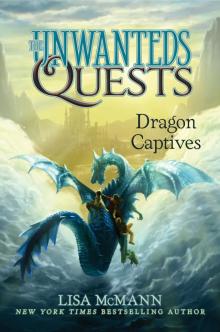 Dragon Captives
Dragon Captives Project Chimera
Project Chimera Fade
Fade Island of Graves
Island of Graves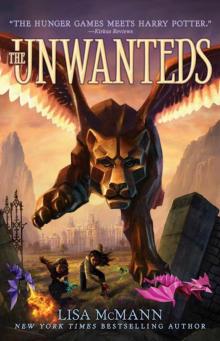 The Unwanteds
The Unwanteds Gone
Gone Island of Silence
Island of Silence Island of Legends
Island of Legends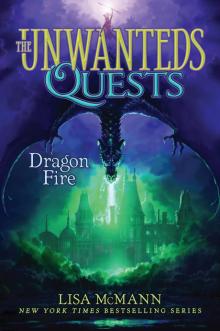 Dragon Fire
Dragon Fire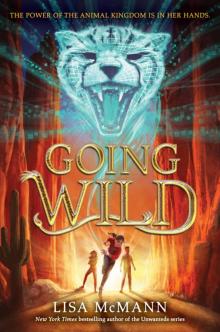 Going Wild
Going Wild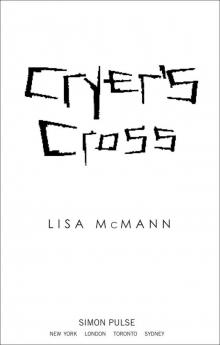 Cryer's Cross
Cryer's Cross Gasp
Gasp Island of Dragons
Island of Dragons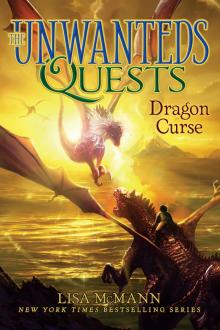 Dragon Curse
Dragon Curse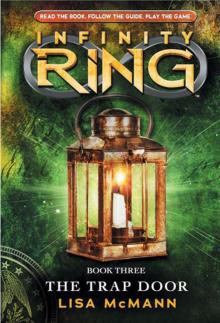 The Trap Door
The Trap Door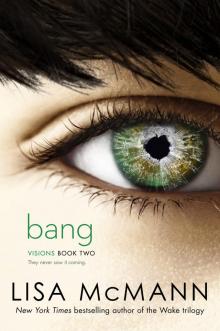 Bang
Bang Dragon Bones
Dragon Bones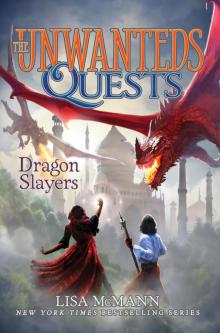 Dragon Slayers
Dragon Slayers Island of Shipwrecks
Island of Shipwrecks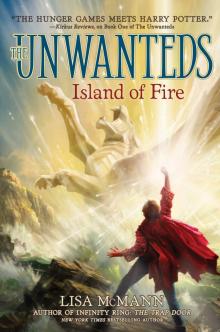 Island of Fire
Island of Fire Dead to You
Dead to You Crash
Crash Island of Silence (Unwanteds)
Island of Silence (Unwanteds)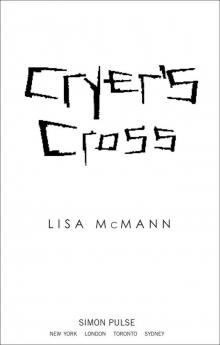 Cryer's Cross (Multimedia eBook Edition with Video)
Cryer's Cross (Multimedia eBook Edition with Video)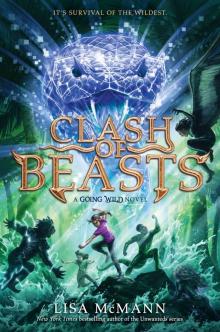 Going Wild #3
Going Wild #3 Gasp (Visions)
Gasp (Visions) Crash (Visions (Simon Pulse))
Crash (Visions (Simon Pulse))